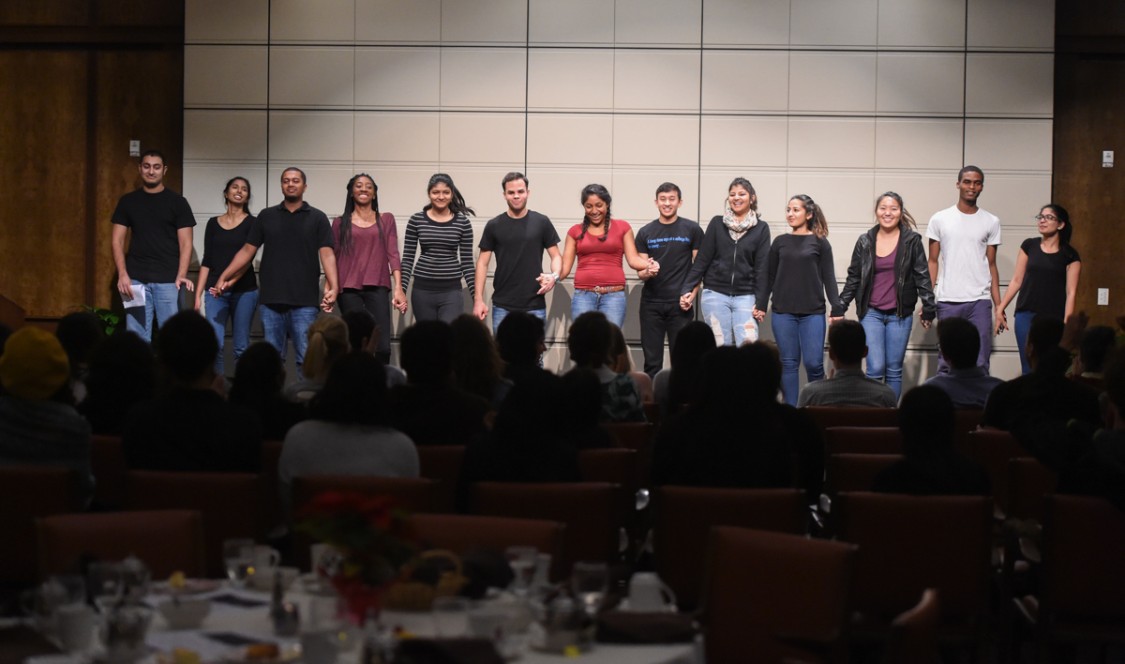At a moment when understanding and appreciating difference in the world could never be more timely, CMC students acted out scenes at the Athenaeum on December 3 which dealt with this very issue.
It was the workshop production of the Freshman Humanities seminar entitled “Bollywood: Dreams in their Social-Historical Context” taught by the Chair of CMC’s History Department, Professor Nita Kumar.
The workshop was part of a new initiative at CMC in which Mellon Fellow Irfana Majumdar, a theatre artist based in Varanasi, India, worked with a diverse group of students; and it met four times in the semester-long class. Majumdar’s participation was funded by the Mellon Global Visiting Scholars Program.
The performance helped students learn about “power” and how to understand “difference” in the world through using their bodies and theater techniques. In the performance, students used their own and faraway popular stories to explore power structures in all their lives, to express different versions of reality, and also the possibilities of change.
“All of us have stories, tell stories and listen to or watch stories,” said Kumar. “Every story is about power, exercised by whoever tells it—and therefore by whoever can re-tell it. Bollywood is a culture industry that relies for its success on telling stories.”
According to Kumar, the student performers came to understand the manipulation done by forms of storytelling such as the use of music and body language because they performed the same manipulation on stories themselves. At the Athenaeum, students performed three stories in multiple versions: Cinderella, a Kannada story from South India, and a scene from the Hindi movie English Vinglish.
“They understood about Bollywood, about culture industries in general, and about “interpretation,” a lesson they can carry over to other classes,” she said.
Majumdar said that in the workshops the students worked on different techniques of improvisation and devising scenes, using prompts and limitations, or structures. “We discussed and experimented with theatrical elements and devices, such as music, sound effects, costumes, props and setting,” she said. “And we kept discussing the larger ideas and connecting them to the scenes as they developed. The workshop was really an exercise in how to bring all these layers together.”
For Kyra Agarwal ’19, one of the student performers, the workshop represented a different way to explore issues that had been covered in Kumar’s class by allowing the students to experience it firsthand through acting out scenes.
“The workshop allowed us to think out of the box, but most importantly to think of the essence of certain stories and identify key issues with the way in which it had traditionally been portrayed,” she said. “This workshop was not only an eye-opener, but also taught me to appreciate each person’s background so much more. Having lived in India all my life, I really appreciated that my peers were making a conscious effort to learn more about South Asia in terms of history but also cultural practices, and become culturally sensitive as well as aware through the process of these workshops.”
One of Majumdar’s principal interests as a director and teacher is how to translate complex ideas into performance.
“One part of this includes working with young people to see how the things they study academically can be illuminated further through theatrical work,” she said. “This workshop was an opportunity for me to continue my research into this, and apply it to this particular course and topic. Also, since the course is on Bollywood it also gave me a chance to bring together film and theatre, and see how they can relate.”
##

